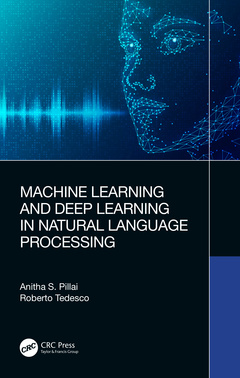Machine Learning and Deep Learning in Natural Language Processing
Coordonnateurs : Pillai Anitha S., Tedesco Roberto

Natural Language Processing (NLP) is a sub-field of Artificial Intelligence, linguistics, and computer science and is concerned with the generation, recognition, and understanding of human languages, both written and spoken. NLP systems examine the grammatical structure of sentences as well as the specific meanings of words, and then they utilize algorithms to extract meaning and produce results. Machine Learning and Deep Learning in Natural Language Processing aims at providing a review of current Neural Network techniques in the NLP field, in particular about Conversational Agents (chatbots), Text-to-Speech, management of non-literal content ? like emotions, but also satirical expressions ? and applications in the healthcare field.
NLP has the potential to be a disruptive technology in various healthcare fields, but so far little attention has been devoted to that goal. This book aims at providing some examples of NLP techniques that can, for example, restore speech, detect Parkinson?s disease, or help psychotherapists.
This book is intended for a wide audience. Beginners will find useful chapters providing a general introduction to NLP techniques, while experienced professionals will appreciate the chapters about advanced management of emotion, empathy, and non-literal content.
Preface. Editors. Contributors. Part I Introduction. Chapter 1 Introduction to Machine Learning, Deep Learning, and Natural Language Processing. Part II Overview of Conversational Agents. Chapter 2 Conversational Agents and Chatbots: Current Trends. Chapter 3 Unsupervised Hierarchical Model for Deep Empathetic Conversational Agents. Part III Sentiment and Emotions. Chapter 4 EMOTRON: An Expressive Text-to-Speech. Part IV Fake News and Satire. Chapter 5 Distinguishing Satirical and Fake News. Chapter 6 Automated Techniques for Identifying Claims and Assisting Fact Checkers. Part V Applications in Healthcare. Chapter 7 Whisper Restoration Combining Real- and Source-Model Filtered Speech for Clinical and Forensic Applications. Chapter 8 Analysis of Features for Machine Learning Approaches to Parkinson’s Disease Detection. Chapter 9 Conversational Agents, Natural Language Processing, and Machine Learning for Psychotherapy. INDEX.
Anitha S. Pillai is a Professor in the School of Computing Sciences, Hindustan Institute of Technology and Science, India. She obtained a Ph. D. in the area of Natural Language Processing and has 3 decades of teaching and research experience. She has authored / co-authored several papers in national and international conferences/ journals. She is also the Co-founder of AtINeu - Artificial Intelligence in Neurology focusing on the applications of AI in neurological disorders.
Roberto Tedesco earned a Ph. D. in Computer Science, in 2006 at Politecnico di Milano (Italy), where he was contract professor for the Natural Language Processing (NLP) and the Accessibility courses. He is now researcher at the Scuola universitaria professionale della Svizzera italiana (SUPSI), in Lugano (Switzerland). His research interests are NLP, assistive technologies, and HCI.
Date de parution : 10-2023
15.6x23.4 cm
Thèmes de Machine Learning and Deep Learning in Natural Language... :
Mots-clés :
Neural Networks; Parkinson; empathy; emotion irony; Text-to-Speech (TTS); fake news; Irony; Conversational Agent (CA); Chatbot; TTS; CA; NLP; Recurrent Neural Networks; Dl Model; Hidden Transformations; Audio Clip; GMMs; Gaussian Mixture Models; Convolutional Layers; Support Vector Machines; Saliency Maps; NLP Task; Handcrafted Features; Emotional Capturer; Feature Extraction Stage; Apache OpenNLP; Ml Model; Parkinson's Disease; Dynamic Microphone; Esophageal Speech; Speech Enhancement; Reinforcement Learning Approach; Personal Assistants



